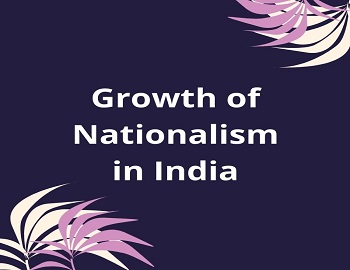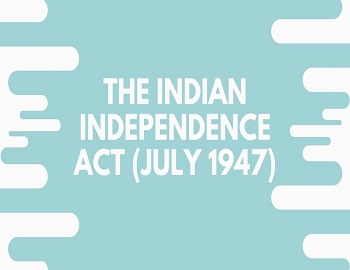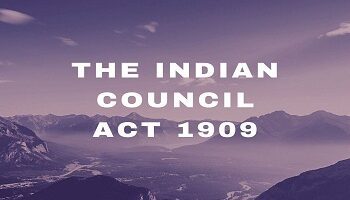Growth of Nationalism in India:
The Revolt of 1857 had led to the opening of a new era in the national history of India. Indian masses turned over a new leaf and a national awakening gripped them. Consequently, a powerful current of patriotism ran throughout the length and breadth of the country and the demand for freedom of India went on gathering force. There were, in fact, a number of causes at the back of this national awakening in India. They can be described as under-
(1) Foreign Domination- The miserable conditions created by the foreign rulers helped a lot in the growth of national sentiments in the hearts of the people of India. The imperialistic designs of the British rulers adversely affected the life of the people of India and consequently, they gave rise to the national movements in India.
(2) Western Education- The spread of modern education contributed greatly towards the development of national consciousness. People read the works of Benthem, Milton, Burke, Voltaire, Rousseau, Kant, Thomas Paine, John Stuart Mill, Mazzini etc. which inspired in them the feelings of independence, equality, democracy, nationalism and patriotism. The educated Indians played an important role in spreading the national feelings in the country.
(3) Role of the Middle Class- With the inputs provided by western education and the growth of liberal thoughts, a new urban middle class emerged in India. This group comprised professionals like lawyers, doctors, teachers, journalists, bankers and others. Exposure to western ideas made them more conscious of their rights. Ideas of freedom and equality inspired them. They opposed the government for suppressing these ideas and denying basic human rights to the people. The middle class became believers of nationalist ideas and provided leadership to the national movement.
(4) Unified System of Administration- A unified system of administration encompassing the law and order machinery, judiciary system and land revenue administration was introduced by the Brtish for better exploitation of Indian resources, but these, in turn, unified the Indian people, generated a common set of grievances and prepared the people to fight against the fountainhead of those grievances- the British government.
(5) Socio-religious Movement- Socio-religious movements of the 19th century had a special hand in creating a national awakening among the Indian people. The reformers of this century like Ram Mohan Roy, Ishwar Chandra Vidyasagar, Swami Dayanand Saraswati, Sir Syed Ahmed Khan and Swami Vivekananda infused a new life in the people through their speeches and writings.
(6) Role of Press- The growth of the Press in India had played an important role in the awakening of the people in the 19th century. The Press is an important medium for the dissemination of information on various issues. It awakened the people of India to the need for socio-religious as well as political reforms. It became an instrument of the growth of nationalism. By its criticism of the British Government’s wrong policies, the press played a vital role in arousing nationalist sentiments and consciousness among the masses. Prominent newspapers like Amrit Bazar Patrika, The Hindu, The Tribune, Bengalee, Kesari, Maratha etc. largely aroused the national feelings and outlook in the minds of the Indian people. The newspapers and literacy work brought out during this period were mainly devoted to propagating the case for social reforms. Press provided a forum for the expression of public opinion on matters of public interest. Literary works also contributed to the growth of modern ideas and attitudes. Bankim Chandra’s Anand Math with its ‘Bande Mataram’ hymn inspired millions of Indians to seek their country’s freedom.
(7) Economic Exploitation- The British government had exploited the Indian people economically with the result that our trade, crafts and industry were destroyed. The country became very poor and it led to a feeling of discontentment among the people. Naturally, they began to dream of the independence of the country.
(8) Rediscovery of India’s Past- The research of several European and Indian scholars, such as Max Mueller, Monier Williams, Swami Vivekananda and R.G. Bhandarkar started to give a new picture of the history of India. These researches proved that India had a well-developed political system, rich cultural heritage and flourishing trade with the outside world. It helped in providing self-confidence to the early nationalists in countering the colonial myth that India had a long history of servitude to the foreign rule. Rabindranath Tagore had said about Vivekananda, “If you want to know India, study Vivekananda. In him everything is positive and nothing negative”.
(9) Lord Lytton’s Administration- The Indians were greatly hurt by the reactionary policies of Lord Lytton. In 1876, he reduced the maximum age limit for the ICS examination from twenty-one to nineteen. He arranged the Delhi Durbar (1877) at a time when the larger part of India was in the grip of famine. He passed the Vernacular Press Act (1878) which curbed the liberty of the Indian Press. His Arms Act (1878) was a means to prevent the Indians from keeping arms. All these measures created widespread discontent among the Indians.
(10) The Ilbert Bill Controversy- The Ilbert Bill was presented in the Central Legislature during the Viceroyalty of Lord Ripon. The Bill tried to remove racial inequality between Indian and European judges in courts. This Bill was opposed by the British residents in India. Ultimately the Bill was modified.
Hence the Indians were compelled to organize themselves for getting their demands fulfilled by the government. They grew nationally conscious to fight against injustices.









Comments (No)